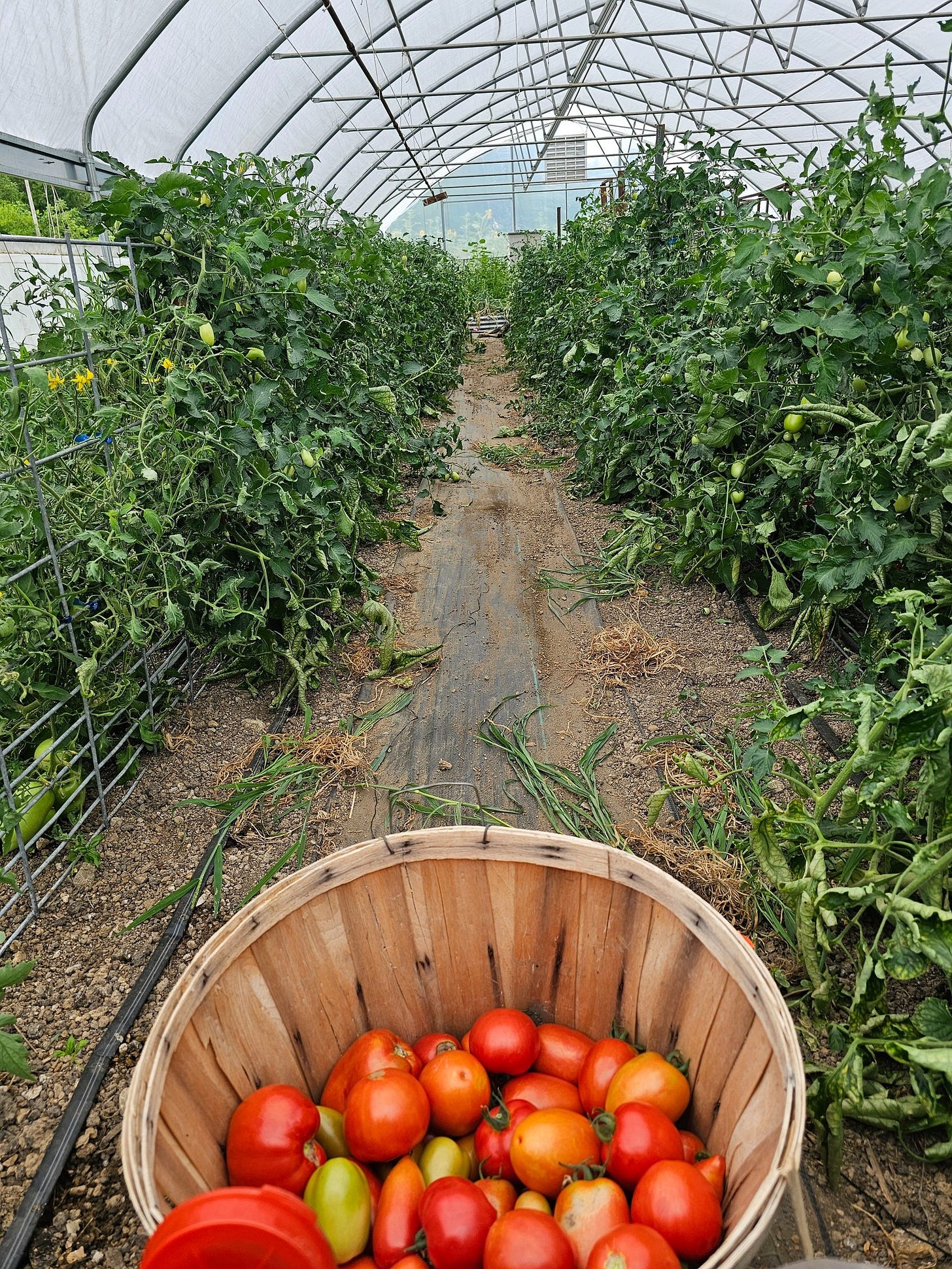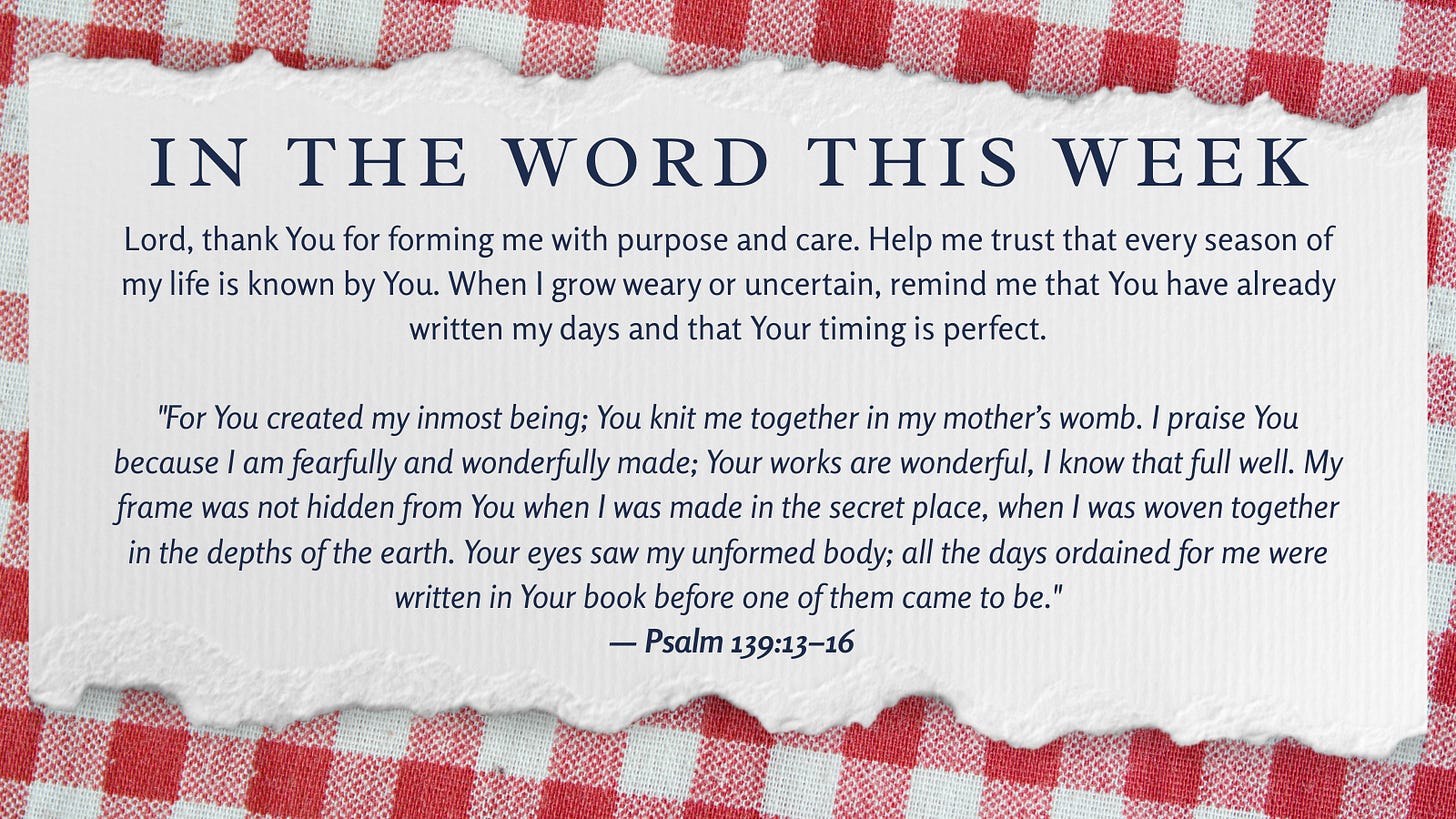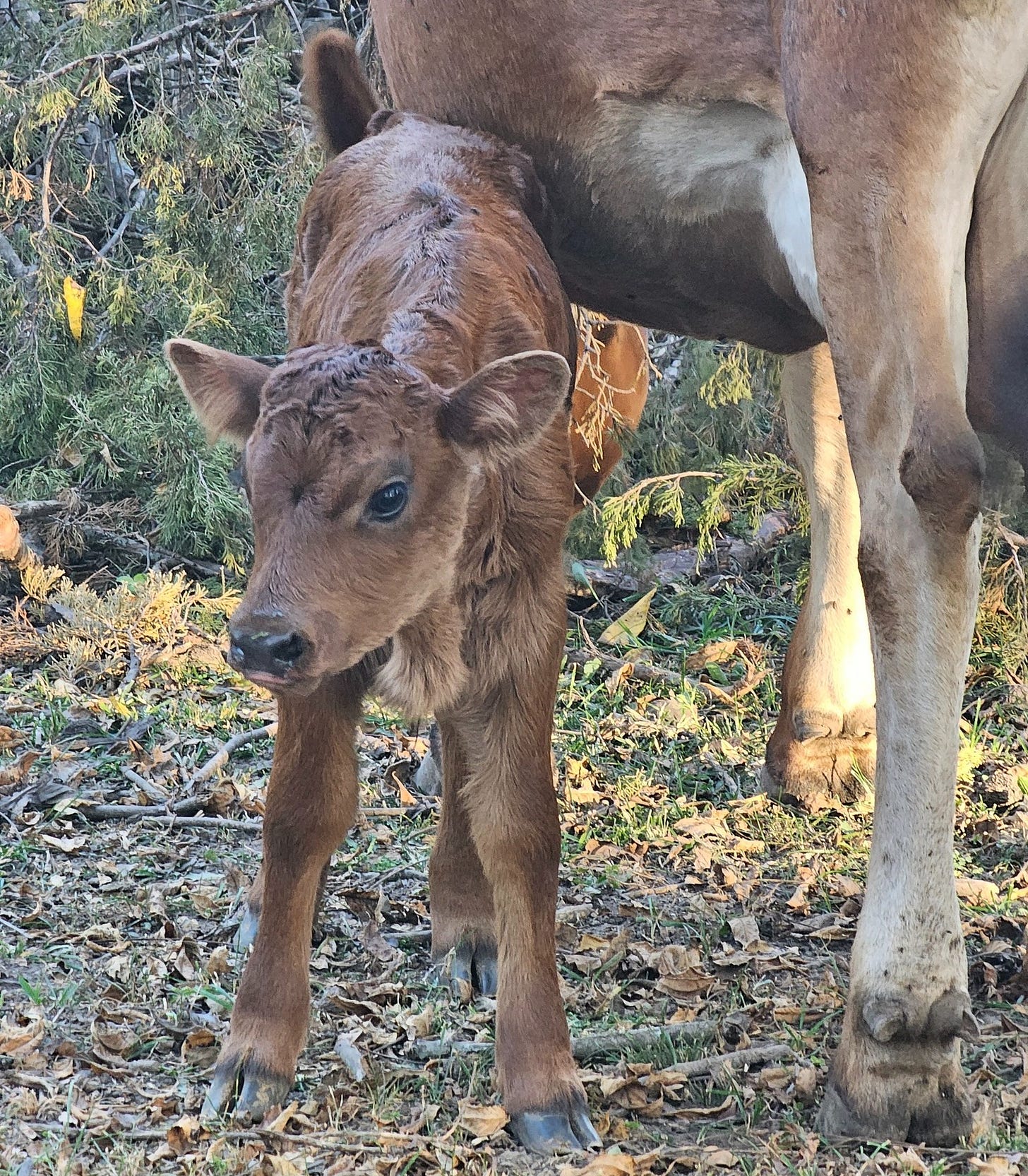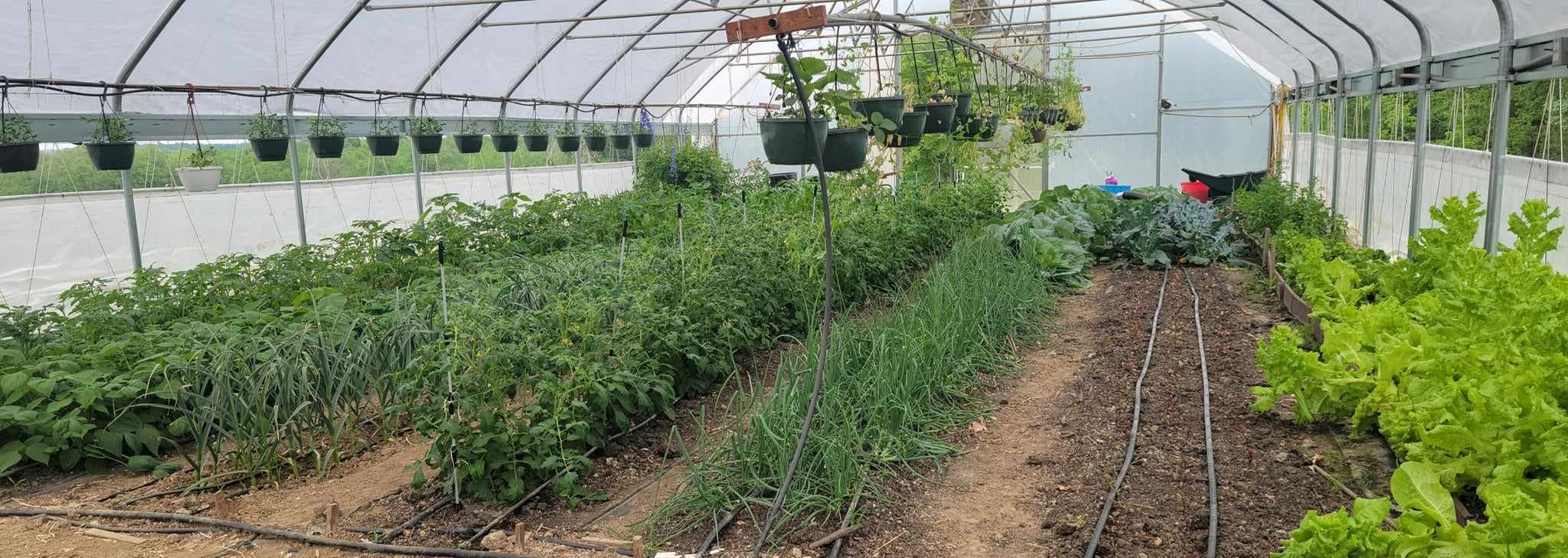The Season You’re Resisting Might be the One That Refines You
An article about the seasons of life, a simple buttermilk biscuit recipe, and a prayer
If your email is cutting this off, read the full journal issue here.
Today’s journal issue features a meaningful article written by one of my childhood mentors, Alicia Glendenning. She is a wife, mother, and homesteader living in northwestern Illinois, where she enjoys gardening, baking, and milking her Jersey cow, LaVita. Finding beauty in family and God’s creation has been one of the greatest joys of Alicia’s life. I believe you’ll enjoy this article, in which she reflects on the beauty found in each season of life while sharing heartfelt stories from her homestead. And yes—all of these lovely images are from her very own homestead, Hopeview Acres. I highly recommend reading this over your favorite coffee or tea and reflecting on the seasons of life. Be sure to follow her blog, Hopeview Acres Happenings, to read more about her journey on the homestead and her “5 Months of No Grocery Shopping” challenge, where she shares about not going to the store for five whole months—how amazing is that? Thank you, Alicia, for this beautiful writing!
By Alicia Glendenning
The days have begun to cool on our homestead. They have gone from scorching, to pleasant, and the nights remind us that sweatshirt season is right around the corner. The light, which used to stretch until 9pm, now surrenders to darkness earlier each night. Responsibilities change every season, and over the last 10 years, I have learned to appreciate the rhythm.
Ecclesiastes 3:1-2 reminds us that “To every thing there is a season, and a time to every purpose under heaven: A time to be born, and a time to die; a time to plant, and a time to pluck up that which is planted.”
Isn’t it interesting that in the same verse, God reminds us that not only are there seasons in the planting cycle, there are also seasons in life? The longer I homestead, the more aware I have become to the joys and responsibilities of each season and how it relates to the different seasons of our lives. While every analogy breaks down at some point, the picture of our lives as they relate to the seasons can give us an appreciation for where we are and what is to come. It is easy to want to rush to the next season, but each one has it’s own merits that are meant to be enjoyed.
The first season on the homestead starts in late winter. There is still snow on the ground and a deep chill in the air, but it is a critical time to plan and prepare for the upcoming year. In the same way, as we are knit together by God in our mother’s womb, He plans and prepares us to live the lives He ordained for us (Psalm 139:13-16).
Isn’t it beautiful how we are formed by God, intricately woven together for the days that God wrote for us before we were even born?
As spring approaches, I head out to my grow room with seed packets, soil, and planting trays. I fill each tray with soil, and begin planting the things I want to grow—tomatoes, peppers, basil, broccoli, cauliflower, flowers, and more. Each seed I place in the soil represents a bit of the hope I have for the future. I know I cannot make them grow, but I also know that if I never plant any seeds, I will be guaranteed no harvest. In the same way, early in our lives, we plant seeds of things we hope to obtain in the future. If we desire a career, we put in the time for education; if we desire to be a homemaker, we put in the time to learn the skills of homemaking. We cannot make them happen on our own, but we plant the seeds with hopes of a good harvest.
If there is one thing that homesteading has taught me, however, it is how little control I have. I can do all the right things, but only God can make the seeds grow. I am completely dependent on Him. My will has to be surrendered to His will. Some seeds germinate quickly, while others seem to take forever, and some don’t germinate at all. It is tempting to focus on what hasn’t germinated. I usually start about 1000 seedlings each spring. I can have 950 that have sprouted and are doing well, but if I allow myself, I can become discouraged about the 50 that haven’t germinated yet. Instead of rejoicing in the growth and new life all around me, I hone in on the barren little cubes with no signs of life.
In the same way, there are times in our lives when some of the seeds we have planted don’t seem to be coming to life. Perhaps our desire is to have a career, but the only jobs open are not what we were hoping for. Or perhaps it is to marry and have a family, but we have no prospects. We can miss the excitement of the 950 other things that are growing and coming to life in our lives because we are focused on the seeds that have not yet or may not germinate. Our perspective and focus affect so much.
Will I choose to be grateful for the blessings God has allowed to grow? Will I pour myself into my relationship with Him, learning to trust His plans for my life? Or will I focus on the things that have not come to fruition in my timing and become disillusioned with the fifty barren cells in the midst of the bounty?
Truthfully, celery is the worst. Every year I become convinced that my celery seeds are just not going to germinate. Everything else is 6 inches tall, and there are my cells of celery—empty and lifeless. The seedlings of celery are about the thickness of hair, so they are easy to miss. Eventually, if I get close and squint my eyes, I can see tiny seedlings start to emerge. It is never in my timing, but I have learned to trust The One who is in control.
In this season of life, it is important to remember that the failure or delay of a specific seed to germinate is not an indication of a failed season. It is simply a small part of a much larger plan that is coming to fruition.
And while there is a crazy amount of effort put in, there is very little fruit in this season. You can get radishes in 30 days, but other than that, most of your crops are going to need several months to grow and mature. This is a time of working, waiting, learning, and growing in the knowledge of the goodness and Sovereignty of God.
Within eight weeks, the soil has warmed and the rush begins. Late spring is intense. There are beds to till, seedlings to transplant, watering systems to set up, pregnant cows and rabbits to assist, baby animals to care for, and more. The to-do list is long, and each morning I wake up with a million things floating around in my head. Spring is an exciting season of new beginnings. Watching the homestead wake up from its winter slumber gives me a renewed sense of purpose and joy. It is also an exhausting season. Each night I fall into bed fatigued, making a mental list of the things left undone.
My early married life was this way. With a household to run, babies to feed, and toddlers to manage, I was completely exhausted. Showering was a luxury, and cleaning the house seemed like an exercise in futility. It was in this season I had to relinquish my ideas of perfection. The level of cleanliness I maintained as a married woman without kids was impossible to continue with the feral little ones I had roaming around.
It was also an exciting time of new beginnings. First baby, first tooth, first steps, first temper tantrum, but also a time of sleepless nights, tight finances, and marital adjustments. Training my little brood and slipping in rare minutes of conversation with my husband took precedence over vacuuming the living room. Every night I would fall into bed with what felt like a million things left undone. People kept telling me that it goes fast, but while the years were short, the days seemed long.
For those of us who are unmarried, this is a special time of life where we are able to be wholly devoted to the Lord. Paul commends this in 1 Corinthians 7. Some marry young, but some God keeps for Himself for a while longer. While this is a commended position, it is certainly not easy. Sometimes it can be hard to find your place among what seems to be a familial social structure. But this is still a busy time of life. A time where incredible and rare seedlings are able to grow. You are free from familial responsibilities and able to serve the Lord on a different level. He has claimed you all to Himself for this period of time, and He adores you. You are chosen for a special relationship and a special purpose. Every day of your life was written before you were ever born. Don’t become discouraged if the seedlings that are growing and taking root look different than those of your peers. In Scripture we see time and time again that before God does a great work, there is usually an extended time of waiting in which the Lord draws that person extraordinarily close to Himself (Think Joseph, Elizabeth, Abraham, Hannah, David).
Remember that you are precious, loved, and seen by the God of the Universe.
Eventually Spring gives way to summer, the spring rush slows down, but now the battles begin. Weeds, Bugs, Weeds, watering, did I mention weeds? This is the season that is easy to grow weary in well-doing. The excitement of the new life has passed, and now we are moving into more of a routine. The plants become established, the new calves and chicks find their stride, and the intensity gives way to a more manageable pace. Milking, weeding, and feeding animals fill the days, and there is a joy in watching the hard work of spring take root, flower, and begin to produce. While it still requires intentionality, it does not require the fervor of spring’s tempo. However, now we trade the intensity of spring for the more mundane and hard work of maintaining and managing the abundance we have been given.
For example: with the new spring calves comes milk from the milk cow. Milking twice a day is just the beginning. At her peak, our cow gives about 5 gallons per day!! Many times there are 10 gallons of milk in my fridge that need to be made into cheese and butter and yogurt. The eggs are usually in abundance at this time as well. It is a time that we either freeze dry or make noodles to preserve the abundance. The garden also needs to be weeded… often. There is also a lot of problem solving that happens in this season. Why is this sheep not gaining weight? How do I solve the bug infestation of my squash? Why are my cabbage heads splitting? It is easy to let things slide, but if I do that, things quickly spiral out of control (especially with the weeds).
As my youngest inched closer to five years-old, I felt the physically exhausting season of babies and toddlers gave way to a less demanding pace. Gone were the days of dirty diapers and teething rings, replaced by time spent learning to read and tying shoes and correcting bad attitudes. Showering was no longer considered a luxury, and sleeping through the night became more commonplace. Twenty minutes of quiet no longer meant that mischief and mayhem were afoot, and rooms that were cleaned remained that way for a significantly longer period of time (depending on which child was in it).
As the physical demands decreased, the emotional demands increased. It seems like it is the season of training and problem solving. In this season, we are trying to help those God has entrusted to us (whether our own children or those He has brought into our lives through other means) to understand who He is and learn to love Him. We are trying to help them cultivate a love for His word, and are working hard to remove any weeds that could grow up and strangle out their love for Him.
Summer is also a season where we begin to see some fruit from our labors. Broccoli, cabbages, green beans, and many herbs are ready in this season. We begin to be able to enjoy some of the fruits of our labors, while others like tomatoes and peppers will still take a few more months to produce.
I have learned that diligence is key in this season, even when I am emotionally exhausted. Sometimes it is easy to pretend that a problem isn’t there, but by delaying addressing it, that problem can have disastrous consequences. There is also a lot of humility in this season. Again, despite my best efforts, a blossom end rot epidemic can take out my entire tomato harvest. My best efforts in teaching my children to love the Lord does not guarantee that they will choose to follow Him. There is a constant reminder that I am not in control of anything except my own actions, attitudes, and responses. The rest is up to God. It is easy in this time of life to unintentionally have an attitude of entitlement. There was a particularly difficult time when I found myself saying, Lord, I did all the things. Why is this not working out? I felt as if I had done A, B, and C, that God was required to bless my good efforts.
But then He reminded me that His ways are not my ways. In Isaiah 55:8-9 He reminds us, “For my thoughts are not your thoughts, neither are your ways my ways, saith the Lord. For as the heavens are higher than the earth, so are my ways higher than your ways, and my thoughts than your thoughts.
God calls us to be faithful… not successful (whatever our expectation of success is). His idea of success is faithfulness and obedience on our part, and we must not give up if our expectations are not met.
Elijah is considered to be one of the greatest prophets. He called down fire from heaven, calling the people of Israel to repentance and to come back to God. For a moment, it looked like all of his expectations were coming to fruition, but then Jezebel ruined everything and threatened to kill him. He was devastated and fearful, everything he had dedicated his life to failed. He was so despondent that he spent 40 days wandering around in the desert aimlessly until he finally ended up at the mountain of God. The children of Israel never did repent and turn back to God under the ministry of Elijah, but God certainly did not consider him to be a failure. The summer season is a test in faithfulness.
As the summer heat dissipates and cooler temperatures take over, life on the homestead ramps up once again. While not as intense as the spring, early fall is probably the busiest season on the homestead. Harvesting, canning, and preserving fill the shortening days. Cleaning, organizing, and preparing become a priority. We add deep bedding to the stalls, and change to heated waterers. An urgency lingers in the air, whispering that time is short and winter is coming. Then one night the hard frost comes and the season is done. The plants that were alive the day before, now lay lifeless, bitten by the frost.
In the same way, teenagers and older children bring busy schedules. Of my four children, two are still at home and their calendars are full! School projects, church, youth group, outings with friends, and sports can set a dizzying pace. There is a sense of urgency, it whispers that time is short, that change is coming, and that life will never be the same. Then, all of a sudden, it’s done. The graduation celebrations come and go. And no matter how much you prepare, you are never quite ready for that final hug, as you leave your child to start this new phase of life at college or in their first apartment. You look back and wonder where the time went. You smile at the memories of them as babies and toddlers, and ugly cry in the car on the way back home.
And then you walk through the door to your very quiet house. The halls that were once teeming with life, now lay silent.
Late fall is a time of reflection and readjustment. The plants are removed and compost is added to the beds, feeding the soil, and adding a new richness. As I close the greenhouse doors for the season, a sweet sadness washes over me. A gratitude for all that was, and a bittersweet realization that the season is over.
As our kids leave the nest and our homes grow quiet, there is a time of reflection and grief. There is gratitude for all that was (and a thankfulness that we did not kill our more difficult children), but also a sense of loss as the purpose we have so long dedicated our lives to is finished.
There is a time of reflection, and also a readjustment of trying to figure out what is next. It is ok to grieve. It doesn’t help that we are usually at some point of perimenopause or menopause at this point as well. Everything is changing, and as we readjust, there is time to add a richness in our relationship with God. Even if we work full-time at this point, we are no longer running to all the kids’ events, and we have the freedom to invest into our relationship with our precious Savior who has stood by and carried us through so much.
Then comes the winter. Winter is a completely different season, so unlike the rest. I never used to like winter before we had our homestead, it was simply an inconvenience for everything I wanted to do. But as we worked year after year, I found myself looking forward to winter more and more. I love sitting by the fire with a cup of coffee as the snow swirls outside my window. I love watching the trees and land get covered with a blanket of snow, tucking them in for a good rest. Winter gives me two things that no other season does… time and rest.
Everything slows down. The baby animals have been raised and weaned; the meat chickens, hogs, and steers are safely stored away in the freezer. The shelves are overflowing with jars of veggies and fruits, spaghetti sauces, soups, and jellies that have been canned. The hard work of the season is finished and there is time to enjoy the fruits of our labors. Chores that took us 3-4 hours a day, now take 30 minutes.
I love when the grown kids come back home and we eat dinner together and play games. I love adding family members as our children find their spouses. I am looking forward to spoiling my grandchildren someday if anyone has any. There are so many things to enjoy as the winter progresses.
But winter is also an uncomfortable season. The ice covered roads and frigid temperatures can make it hard to get around, just as our aging bodies remind us that they are not as young as they used to be. I don’t know if any of you have experienced this, but there are times that I go to bed, and everything seems to be working pretty well… then in the morning, I wake up and something hurts. What is with that?
But winter is not just a time for rest. It is also a time to invest and plan for the next season. In the winter season, we have so much more time to sit with the Lord (and so much less ability to do anything else). There is time to talk and commune with Him. There are opportunities for long conversations and anticipation of the coming season. Winter becomes a precious, precious time despite the pain and discomfort. And then it happens. We close our eyes for the last day of winter and open our eyes to a new spring!
Oh the glory that will be when we open our eyes for the first time in Heaven and see the Savior face to face. When the relationship that has been cultivated for so long culminates in the fulfillment of every hope and desire of our souls. No more pain, no more sorrow, no more disappointment or struggle, just pure joy and contentment in the arms of our Savior forever.
And that, ladies, is a season that will never end.
In the Kitchen
Homemade Buttermilk Biscuits
Yields: 8–10 biscuits
Ingredients:
2 cups all-purpose flour (plus extra for dusting)
1 tbsp baking powder
1/2 tsp baking soda
1 tsp salt
6 tbsp cold unsalted butter, cubed
3/4 cup cold buttermilk
Directions:
Preheat your oven to 450°F (230°C) and line a baking sheet with parchment paper.
Mix dry ingredients: In a large bowl, whisk together flour, baking powder, baking soda, and salt.
Cut in the butter: Add the cold cubed butter. Use a pastry cutter, fork, or your fingers to cut the butter into the flour until it resembles coarse crumbs.
Add the buttermilk: Pour in the cold buttermilk and stir gently until the dough just comes together. Don’t overmix to keep the biscuits fluffy.
Knead lightly: Turn the dough onto a floured surface. Fold it over on itself 2–3 times to create layers. Pat it to about 1-inch thickness.
Cut biscuits: Use a floured biscuit cutter (or a glass) to cut out rounds. Press straight down—don’t twist, or the biscuits won’t rise properly.
Bake: Place biscuits on the prepared sheet, close but not touching. Bake 12–15 minutes, or until golden brown on top.
Serve warm: Perfect with butter, honey, or homemade preserves.
What a beautiful reminder that every season, whether it’s filled with planting, waiting, or resting, has purpose in God’s plan. I pray this reflection encouraged you to slow down and see His hand in your own season right now. Remember, you were lovingly formed for such a time as this, and He is faithful to complete the work He began in you. Until next time, may your home be filled with peace, gratitude, and the gentle awareness of God’s presence in the everyday.
Want to contribute to our next journal issue? Email founder@younghomemakersclub.com.















